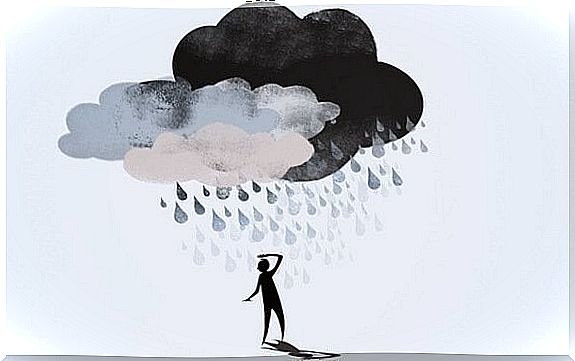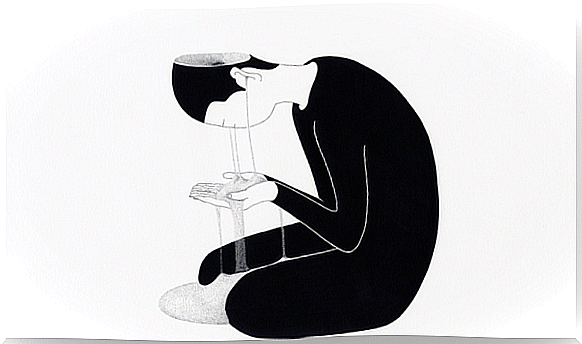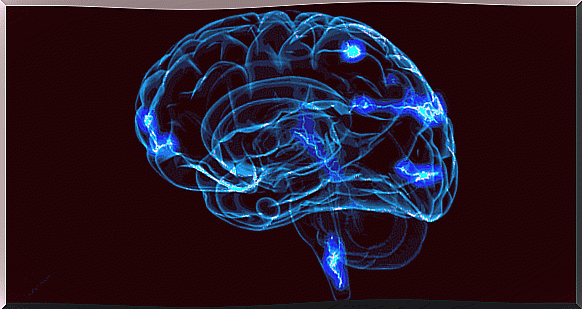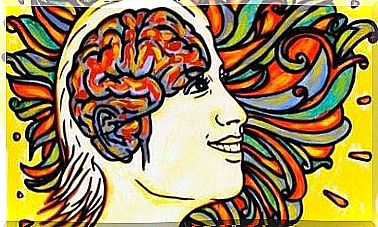Memory Loss From Depression: How Does It Work?

Memory loss from depression is a fact. A depressed brain disconnects you from reality, like a ship lost at sea. It pulls you into its neurochemical storm. It shuts you in a cave where the outside world becomes scary and blurred, where it is difficult to concentrate, remember things, react, think, keep up…
When we think of depression, most of us immediately think of someone lying down on their couch or bed with the curtains drawn. We see it as a psychological disorder that involves being lethargic, down and defenseless . But there are actually many cases of “portable” depression. Thousands of people go through their daily lives with this invisible wound that disrupts almost everything they do.
D epression has a negative impact on your episodic memory, which is your memories of things that have happened to you.
This is because depression is more than just an emotional state . It is also inner suffering, physical exhaustion, apathy and lack of enthusiasm. It is hopelessness that comes into your mind like a Trojan horse. But above all, it is a deterioration of your cognitive abilities. This last thing is an extremely important part of depression that people do not talk much about. But it is something we absolutely must think about in order to develop a more complete, appropriate and sensitive form of therapy.

Memory Loss From Depression: What Happens To Me?
Error understanding signals, and even more problems sending them. Problems understanding what you are reading or hearing. To have a person’s name right on the tongue, but not to be able to remember it. Getting empty when driving and not remembering where to go. Realizing that people get mad at you for not keeping an eye on them when they talk . Living a more and more misunderstood life with the people around you because you can not focus, remember what they tell you, make simple connections, etc.
As you can see, memory loss from depression is more than just forgetfulness. It means getting stuck in a mental fog where everything seems too far away or too gloomy to focus on. You can not understand what is happening, where you are or what to do. All it leads to is discomfort, lack of social understanding and worse: it makes you even more depressed.
But why is all this happening? Where do all these exhausting processes come from?
“Speed up” neurons
Stress is generally only one more factor that increases the risk of depression. Feeling threatened, scared, pressured, alert or anxious… These things cause your whole body to release several glucocorticoids, such as cortisol (the most common and well-known).
A brain controlled by cortisol works very differently. It “speeds up” your neurons and leads to mental processes like nagging, worrying, obsessed thoughts, etc. Something very intense is happening because of all this hyperactivity in your brain . It wants to reduce overactivity, fatigue, and neuronal cell death so that these cells begin to “disrupt.”
This means that your brain stops sending information so quickly. You forget things, your memory gets worse and it starts to slow down and go into “pause” mode.

The hippocampus becomes smaller
Memory loss from depression also has roots in a specific brain structure: the hippocampus. This part of your brain handles, among other things, storing your memories. As strange as it may sound, this is the area where cortisol affects the most. It is almost like a target for all the toxic parts of glucocorticoids. If your depression is chronic, or if you have recurrent episodes, your hippocampus just gets smaller and smaller.
But it is worth mentioning that the hippocampus also has a very high plasticity. You can get it back to its original size through therapy, memory exercises and cognitive strategies. That way, your attention, memory, etc. will also return to normal.
Dopaminergic pathways
One sad reality that comes with depression is anhedonia, an inability to feel pleasure. Because of this psychological disorder, you can not enjoy even the simplest things. You stop feeling any interest, pleasure, motivation or energy when it comes to starting new projects, getting out of the house, working, socializing…
Dopaminergic pathways are the parts of the brain that reward you for those kinds of things (the things your brain sees as positive) . But a depressed brain is one where dopamine does not work properly. It changes everything. You lose your motivation, and more importantly, not having enough of this neurotransmitter also brings about changes in your serotoninergic, glutamatergic, opioid, and endocannabinoid systems.
When all these neurochemical processes cease to function properly, you lose your curiosity and your ability to learn, focus, store new information, remember it, make decisions…

So what can you do?
Memory loss from depression is a fact. But everyone experiences it in their own way. For example, we know that with mild and moderate depression, you can recover from the cognitive deficit, through cognitive therapy, exercises, support groups, etc.
But in more serious cases, you need an interdisciplinary approach. Here you combine medication with psychological therapy, memory-based therapy and even supplements that have magnesium and B vitamins. Of course, you must never forget how important it is to have the support of the people around you. Understanding, intimacy and sensitivity towards a person with depression is an important key to helping them recover.








